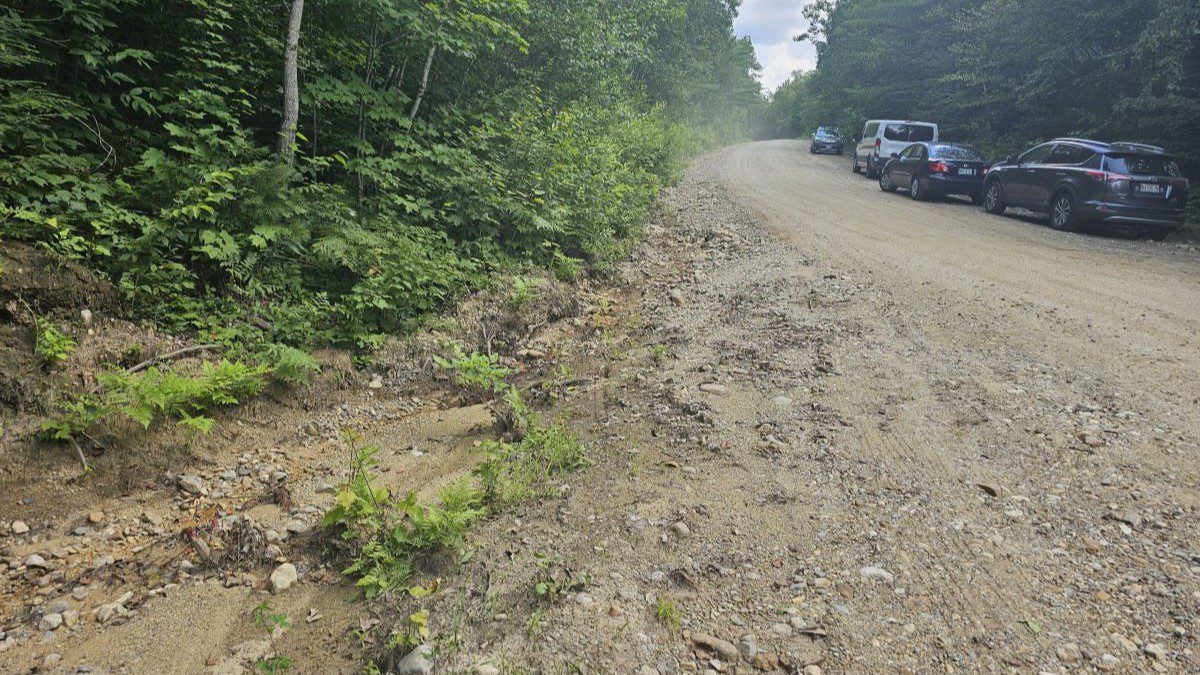After a torrent of late-June rain, the road to the popular Tumbledown Mountain hiking destination has taken on the rough look of a mountain trail — not a paved road meant for cars and trucks.
Water washed out the pavement on the road’s edges and exposed chunks of loose rock, another portion in the road’s center buckled and cracked under the water’s pressure, and land around its culverts slipped into the brook they feed.
Though remedial repairs have already been made to this 2.5-mile stretch of Byron Road in central Franklin County, county officials and the state Bureau of Parks and Lands are grappling with a $70,000 to $100,000 question of who will pay for the rest.
The initial repairs have made the road navigable, but county officials said they would soon put up signs that warn travelers of the damage and corresponding risk.
Both parties were hesitant about that prospect during a July 25 meeting between county officials and Tim Post, the western regional land manager for the state Bureau of Parks and Lands.
The road is owned by the county but has no county residents alongside it, Commissioner Bob Carlton said during the meeting, and most of the land abutting it is owned by the state, disincentivizing the county from footing the entire bill.
“From our standpoint, it just doesn’t make a lot of sense to … spend a lot of money on a road that has no taxpayers on it,” Carlton said.
Further complicating the issue, according to County Administrator Amy Bernard, is the road was in bad shape before the flooding hit. Bernard said the culverts were undersized and the road itself was too wide, stretching from brook to brook in the valley.
Because the repairs would only bring the road back to its previous condition, and Byron Road’s repairs also don’t qualify for disaster relief, Bernard said it wouldn’t be advantageous for the county to spend that amount on a poorly built road.
According to Franklin County’s budget for fiscal year 2024, the county allocated $279,000 for road and bridge services.
“It’s throwing good money on a bad situation,” Bernard said, to nods of agreement from Post.
Bernard acknowledged that the county could discontinue the road and no longer maintain it, but said that was a last resort, and would be a sad and detrimental loss.
“That’s why we’re having this conversation: How do we become partners with you?” she asked Post, who said he would convey the request to state officials.
Off of Byron Road are two trailheads to Tumbledown Mountain and its bald ridges, where Alpine vegetation clings to the rock, and the icy blue waters of Tumbledown Pond.
Early in the pandemic, the road was lined for miles with enthusiastic hikers looking to escape the confinements of their homes and venture outdoors.
The mountain’s trails are consistently listed as some of the best hikes in Maine, and rivals Cadillac Mountain in Acadia National Park, according to a state parks official.
Brent West, executive director of the conservation nonprofit High Peaks Alliance, said Tumbledown Mountain is representative of Maine’s best mountainous qualities.
“Many of Maine’s hikes allow access to dramatic cliff faces, Alpine ponds, bald ridges and closely clustered peaks,” West said. “One of the reasons that Tumbledown Mountain is one of my favorite hikes is because it offers all these features in one place.”
What makes it more special, West said, is the conservation effort that opened it to public access.
In the early 2000s, the lands that envelop Tumbledown Mountain were purchased by conservation groups, including Tumbledown Conservation Alliance and the Trust for Public Land, along with the Maine Department of Agriculture, Conservation and Forestry, to open public access.
“A lot of people locally put money toward the conservation of it,” West said. “So I think that also shows the importance of having access to it. People are willing to up their own personal money to help conserve something like that.”
In separate interviews this week, Carlton and Commissioner Terry Brann both said they favored retaining Byron Road and recognized the road’s importance for tourism, as well as access to the town of Byron and Coos Canyon.
Carlton said the cost of repairs and intensity of this summer’s rain have thrown the county into a tailspin.
He said although talks were in the beginning stages, he hoped the state would step in, and said the road would be a good candidate for the state to turn into a “stream smart crossing” that allows fish and other aquatic organisms to travel freely underneath.
On Thursday, Bureau of Parks and Lands Deputy Director Bill Patterson, said he also hoped the county and state would come to an agreement.
Patterson said the bureau would send an engineer to Byron Road and assess the damage, then come up with a plan to both repair the road and improve it from its previous condition.
“Now we’re seeing, especially this summer, increasing intensity and frequencies of storms,” Patterson said. “So I think it’s good to be thinking about upsizing culverts and making a more resilient road system so that we don’t put it back the way it was.”
Patterson said Tumbledown Mountain and its trails, with steep ascents and more family-friendly paths that are less strenuous, are one of the most well-known in the state.
“Oftentimes it’s the first big hike that people do,” Patterson said. “It’s a really important starter hike for the state of Maine.”







